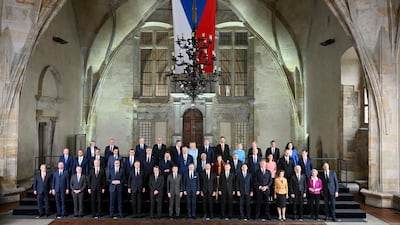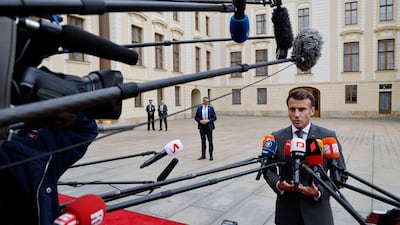Leaders from all corners of Europe were urged on Thursday to find common ground to tackle the continent’s crises at the founding summit of a 44-nation forum.
More than 40 leaders including Turkish President Recep Tayyip Erdogan and Britain’s Prime Minister Liz Truss assembled for the summit in Prague.
Ukrainian President Volodymyr Zelenskyy addressed leaders by video link to encourage them to stand up to Russia and make the new group a “community of peace”.
The format was proposed by French President Emmanuel Macron and brought together the EU with 17 non-EU states in a show of solidarity against Russia.
Russian President Vladimir Putin, and his Belarusian ally Alexander Lukashenko, were the only major European leaders not invited to the European Political Community.
“The meeting is the message,” said one official, who described it as impressive to see countries with often centuries of troubled history behind them working towards common goals.
Europe’s energy crisis was also high on leaders’ minds. Gas exporter Norway said it would do its utmost to ease the energy crunch, while Britain and France looked at closer links between their power grids.
After opening discussions as a group, leaders broke into two groups to discuss security and energy matters before holding more talks in smaller circles and bilaterally.
Mr Erdogan held talks with the leaders of feuding Azerbaijan and Armenia, weeks after deadly clashes between the two, and with Mr Macron.
“It’s a big day for Europe,” was Czech Prime Minister Petr Fiala’s repeated remark to leaders as he greeted them on the grounds of the medieval Prague Castle.

“The whole of Europe is meeting in Prague today to discuss what we can do together to restore peace, boost co-operation and return to prosperity,” Mr Fiala told the summit’s opening session.
“Europe has many difficult problems right now and we meet here to discuss solutions.”
Mr Zelenskyy was applauded after his video address to leaders, in which he said Russia was waging war against all of Europe.
“We, the leaders of Europe, can become the leaders of peace," he said. "Our European Political Community can become a European community of peace."
The summit came on the day the EU formally approved an eighth package of sanctions linked to the war in Ukraine, including a price cap on Russian oil.
Ukraine’s Prime Minister Denis Shmyhal represented his country in Prague and posed for a 43-leader “family photo”.
Britain’s involvement, after Ms Truss had initially taken a dim view of the project when she was foreign secretary, appeared to go down well with European leaders.
Ms Truss “showed dedication to addressing the main crises we are facing in Europe … the impression was quite positive that the UK was engaging with those topics”, an EU official said.
Slovakia’s Prime Minister, Eduard Heger, told The National he was glad to see the UK involved and that it was important to discuss strategy together.
"If you want to build prosperity, that's what we all want for our citizens, so you need to give them a basic value and that is peace," Mr Heger said.

London and Brussels were both keen to emphasise that the forum is not an “EU-plus” or a replacement for Nato, and did not signify the UK rejoining the bloc by the back door.
Likewise, countries such as Ukraine were given assurances that the European Political Community is not a form of second-class EU membership meant to stall their ambitions to join the bloc.
“We are not going to replace the existing formats of co-operation; we have plenty of them already,” Mr Fiala said.
“The point is simple: to have an honest discussion on the matters of common interest, but also on disputed topics.”
German Chancellor Olaf Scholz said the event was an opportunity to improve EU relations with its neighbours, including those undergoing a long accession process.
“This is good for peace, for the security order. This is good for economic development and for prosperity,” Mr Scholz said.
Another non-EU country, Iceland, said the talks showed “Europe stands in solidarity” against the Russian invasion of Ukraine.
“If you just look at the attendance here, you see the importance,” said Belgian Prime Minister Alexander De Croo.
“The whole European continent is here, except two countries: Belarus and Russia. So it shows how isolated those two countries are.”

No formal decisions were expected apart from which country will host the next meeting, with Moldova, an EU applicant, understood to be the front-runner.
But Ms Truss said she wanted to galvanise action on energy and migration, and encouraged leaders to learn lessons from Ukraine by acting before it was too late.
She left with a promise from France and the Netherlands that they would intensify co-operation on disrupting the migrant smuggling route to Britain.
On energy, Ms Truss said talks were under way on closer wind energy co-operation with other North Sea countries, and said she hoped Britain and France could co-operate further on nuclear power.
Also on Thursday, UK company Neptune Energy said it was expanding production in a Norwegian gasfield, in a move it said could heat an extra 550,000 British homes a day.
Mr Macron also set his sights on greater energy co-operation and said he hoped the group could undertake “common projects” together.
But he said he remained opposed to a new gas pipeline linking the Iberian Peninsula to the rest of Europe, a project supported by Spain and Germany.
“I think our priority is rather to get more electricity interconnection in Europe, so I'm more in favour of these projects,” Mr Macron said.
“What does Europe need in the coming years? To produce more electricity on its soil and have a renewable and nuclear strategy.”












